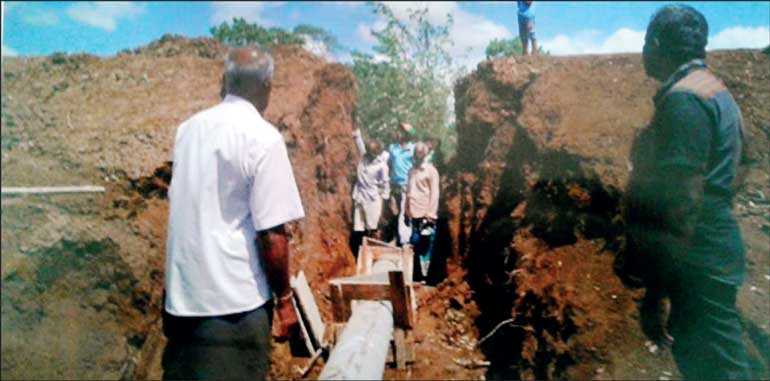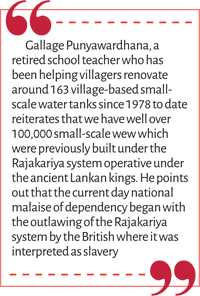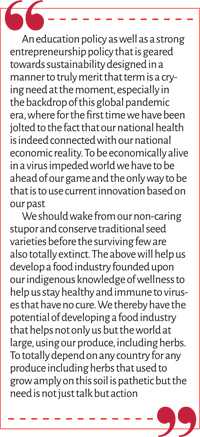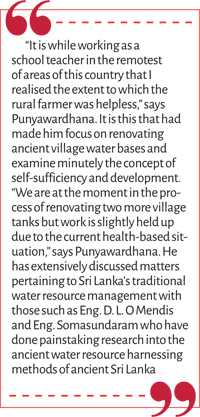Friday Feb 20, 2026
Friday Feb 20, 2026
Saturday, 17 October 2020 00:10 - - {{hitsCtrl.values.hits}}

A village weva being re-built – Pic courtesy Swarna Hansa Foundation document, ‘40 years of Discernment’
By Suryamithra Vishwa
One of the problems of modernity could be that we have approached the concept of development totally forgetting or denouncing and being apathetic to our ancient wisdom, indigenous culture and traditional knowledge.
We thereby have a kind of life that we have built for ourselves that gathers vast information separated from a holistic core as our ancestors had. We have discarded the salient truth that governed all pre-colonial philosophy and policy rooted in the awareness that we are first and foremost connected to the soil.
Everything in life in this country had revolved on respecting the earth, without whose benevolence we will not be able to survive and the nectar of the earth; water, was respected, protected and conserved. Thereby the pre-colonial models of holistic human wellbeing/development in Sri Lanka was centred upon a strong water and cultivation linked policy extending back to the time of Sri Lankan kings.
 |
 |
 |
The concept of wew (Sinhala name for the water resource bases of Lanka) which has been categorised under ‘irrigation’ in modern Western parlance is something unique to this nation. It is indeed a pity that modern focus on development by Sri Lankan development specialists have not concentrated enough on the Sri Lankan hydraulic civilisation which had been the envy of the world.
If we had concentrated consistently on this we should have made the emulation of these ancient initiatives our current day lived in/practised reality. The feats of our ancients still nourish the earth and us through the gigantic reservoirs that have lasted the test of time. There are around 100,000 or more of small-scale village water bases for which the word ‘tank’ is used in English although this term is not accurate. The basic structure of these wew that still exist are from ancient times and are abjectly neglected and forgotten about.
Gallage Punyawardhana, a retired school teacher who has been helping villagers renovate around 163 village-based small-scale water tanks since 1978 to date reiterates that we have well over 100,000 small-scale wew which were previously built under the Rajakariya system operative under the ancient Lankan kings. He points out that the current day national malaise of dependency began with the outlawing of the Rajakariya system by the British where it was interpreted as slavery
The non-governmental organisation initiated by Punyawardhana; the Swarna Hansa Foundation which focuses on village self-sufficiency through traditional knowledge, over four decades ago took upon itself to boost non-poisonous village agriculture. It has been one of the earliest Lankan campaigners against chemical agriculture with the justification that we historically never needed such inputs even though we had large populations.
(There is a Lankan saying that a rooster on a roof in one district will disembark in another district, indicating how populated this country was.)
“It is while working as a school teacher in the remotest of areas of this country that I realised the extent to which the rural farmer was helpless,” says Punyawardhana.
It is this that had made him focus on renovating ancient village water bases and examine minutely the concept of self-sufficiency and development.
“We are at the moment in the process of renovating two more village tanks but work is slightly held up due to the current health-based situation,” says Punyawardhana.
He has extensively discussed matters pertaining to Sri Lanka’s traditional water resource management with those such as Eng. D. L. O Mendis and Eng. Somasundaram who have done painstaking research into the ancient water resource harnessing methods of ancient Sri Lanka.
To understand some points on how we became so alienated from our water resource-based agrarian culture, I below quote brief excerpts from the first edition of the booklet titled ‘Agriculture in Sri Lanka – A Deep Rooted Malaise,’ authored by Gallage Punyawardhana and printed and published by the Swarna Hansa Foundation in 1989 and 1994 respectively.
“A cultivation pattern was developed in such a way so as to last till the sun and moon lasts. This unique system of agriculture in today’s parlance is known as sustainable agriculture. This was not only organic farming but also an organic community that was developed.
“However, this position of self-sufficiency in Sri Lanka was not granted its due place. For the British wanted the Sri Lankan farmers to produce what they wanted so that the British could supply Ceylon what they needed.
“In 1818 they took the first opportunity to put the farmer into peril. It was in 1818 that the British ordered to destroy all tanks, all fruit-bearing trees, all harvests and all cattle and kill all males over 18 years of age.”
The above is quoted in context of revisiting history in connection with some previous writings on sustainability in this page where it was mentioned that we today use the word ‘sustainability’ in a manner that is totally divorced from our past and often rely on foreign experts to advise us as to what this word should mean. It is a calamity that neither our education system nor our entrepreneurship reflect the core of sustainability that was an integral part of the history and psyche of Sri Lankans.
An education policy as well as a strong entrepreneurship policy that is geared towards sustainability designed in a manner to truly merit that term is a crying need at the moment, especially in the backdrop of this global pandemic era, where for the first time we have been jolted to the fact that our national health is indeed connected with our national economic reality. To be economically alive in a virus impeded world we have to be ahead of our game and the only way to be that is to use current innovation based on our past.
This means that to keep our head above a dubious and unpredictable pandemic entwined future we have to depend on ourselves for revisiting our past in order to strengthen our future.
Almost all eateries in Sri Lanka mainly sell bread and bread-based products; an entity that has no roots in our culture and is extremely detrimental to health as it has gluten unless it is made with flour of traditional rice varieties/innovated with other traditional foods/the innovation of jack seed flour, etc.,. This is the time like no other when we should simultaneously encourage and promote traditional water resource management, traditional agricultural methods and traditional food-based entrepreneurship/industries.
We should wake from our non-caring stupor and conserve traditional seed varieties before the surviving few are also totally extinct. The above will help us develop a food industry founded upon our indigenous knowledge of wellness to help us stay healthy and immune to viruses that have no cure. We thereby have the potential of developing a food industry that helps not only us but the world at large, using our produce, including herbs. To totally depend on any country for any produce including herbs that used to grow amply on this soil is pathetic but the need is not just talk but action. We need to motivate every individual to come up with the needed steps to change the status quo.
Our vaccine is our food that grows on this soil and our medicine is our food that grows on this soil and although we are nation that has blindly followed the West into the pit of chemical agriculture at least now it is time to turn the tide. The first step is to begin focusing on our long neglected village water resources. One of the key steps for this is community mobilisation which should commence with motivating every child and adult on the ancient philosophy of the Rajakariya system.
The Rajakariya system is one which represented the duty of the citizen to themselves (to take consistent effort at village development which included the creation and maintaining of water resources, in accordance with the national policy). The Rajakariya system also represented the macro duty of the citizen to the country (to keep the health of the nation intact by producing wholesome food). Today, masked and quaking in fear of viruses we probably need to remove the mask in our brains that fail to see the above.
If we motivate schools and universities to interweave into the current subject curricula, as appropriate, scheduled visits to areas where abandoned ancient village water bases are located, and develop school and university projects to rebuild them, this would indeed be giving an honourable meaning to the concept of ‘education.’ This will help deviate from the memorising phenomena that education has fallen to.
To have hundreds of dilapidated and neglected water tanks in the country while we talk about ‘sustainability’ is indeed comical. As before the responsibility for the renovation and maintaining of these should be ours, the people, and not just the Government. As citizens it is our Rajakariya, our salient duty to our country.